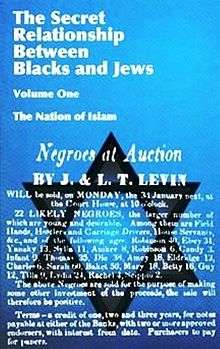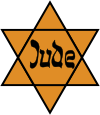The Secret Relationship Between Blacks and Jews
 | |
| Author | Historical Research Department of NOI |
|---|---|
| Country | United States |
| Language | English |
| Publisher | The Final Call |
Publication date | 1991 |
| Media type | Print (Hardback & Paperback) |
| Pages | 334 pp |
| ISBN | 0-9636877-0-0 |
| Part of a series on |
| Antisemitism |
|---|
 Part of Jewish history |
|
Antisemitism on the Web |
|
Opposition |
|
|
The Secret Relationship Between Blacks and Jews is a book released in 1991 by the Nation of Islam, that asserts that Jews dominated the Atlantic slave trade.[1] The Secret Relationship has been widely criticized for being antisemitic, and for failing to provide an objective analysis of the role of Jews in the slave trade.[2][3][4][5] The American Historical Association issued a statement condemning claims that Jews played a disproportionate role in the Atlantic slave trade,[5] and other historians such as Wim Klooster and Seymour Drescher concluded that the role of Jews in the overall Atlantic slave trade was in fact minimal.[6][7] Critics of the book assert that it uses selective citation in order to purposefully exaggerate the role of Jews.[4][8]
Volume Two of The Secret Relationship was published in 2010, with the subtitle "How Jews Gained Control of the Black American Economy".[9]
Critical reception
The book has been labeled an antisemitic canard by some historians, including Saul S. Friedman, who contends that Jews had a minimal role in New World slave trade.[3] Henry Louis Gates, Jr., head of the department of Afro-American studies at Harvard University, called the book "the Bible of new anti-Semitism" and added that "the book massively misinterprets the historical record, largely through a process of cunningly selective quotations of often reputable sources".[4]
The book was criticized for being antisemitic, and for failing to provide an objective analysis of the role of Jews in the slave trade. Common criticisms were that the book used selective quotes, made "crude use of statistics,"[10] and was purposefully trying to exaggerate the role of Jews.[8] Historian Ralph A. Austen criticized the book, saying that the "distortions are produced almost entirely by selective citation rather than explicit falsehood ... more frequently there are innuendos imbedded in the accounts of Jewish involvement in the slave trade,"[11] and "[w]hile we should not ignore the anti-Semitism of The Secret Relationship..., we must recognize the legitimacy of the stated aim of examining fully and directly even the most uncomfortable elements in our [Black and Jewish] common past."[12] Austen acknowledges that the book was the first book on the subject aimed at a non-scholarly audience.[13]
In 1995, the American Historical Association (AHA) issued a statement condemning "any statement alleging that Jews played a disproportionate role in the Atlantic slave trade."[5]
The publication of The Secret Relationship spurred retorts published specifically to refute the thesis of The Secret Relationship:
- 1992 – Harold Brackman, Jew on the Brain: A Public Refutation of the Nation of Islam's The Secret Relationship Between Blacks and Jews.
- 1992 – David Brion Davis, "Jews in the Slave Trade," in Culturefront (Fall 1992) pp 42–45.
- 1993 – Seymour Drescher, "The Role of Jews in the Atlantic Slave Trade," Immigrants and Minorities, 12 (1993), pp 113–125.
- 1993 – Marc Caplan, Jew-Hatred As History: An Analysis of the Nation of Islam's "The Secret Relationship" (Published by the Anti Defamation League).
- 1998 – Eli Faber, Jews, Slaves, and the Slave Trade: Setting the Record Straight, New York University Press.
- 1999 – Saul S. Friedman, Jews and the American Slave Trade, Transaction.
A post-1991 scholar who analyzed the role of Jews in the overall Atlantic slave trade concluded that it was "minimal," and only identified certain regions (such as Brazil and the Caribbean) where the participation was "significant."[7]
Wim Klooster wrote: "In no period did Jews play a leading role as financiers, shipowners, or factors in the Transatlantic or Caribbean slave trades. They possessed far fewer slaves than non-Jews in every British territory in North America and the Caribbean. Even when Jews in a handful of places owned slaves in proportions slightly above their representation among a town's families, such cases do not come close to corroborating the assertions of The Secret Relationship."[6]
The Anti-Defamation League states that Volume Two of The Secret Relationship blames Jews for "promoting a myth of black racial inferiority and makes a range of conspiratorial accusations about Jewish involvement in the slave trade and in the cotton, textiles, and banking industries".[14]
See also
- African American–Jewish relations
- Jewish views on slavery
- Louis Farrakhan
- Nation of Islam and antisemitism
- Slavery in the United States
Notes
- ↑ Austen, pp 131-133.
- ↑ Austen, p 134.
- 1 2 Jews and the American Slave Trade, Saul S. Friedman, Transaction Publishers, 1999 pp. 2, 40.
- 1 2 3 Allah in the West: Islamic movements in America and Europe By Gilles Kepel, Stanford University Press, 1997 pp. 68-69.
- 1 2 3 Encyclopedia of American Jewish history, Volume 1, pp. 199.
- 1 2 Wim Klooster (University of Southern Maine): Review of Jews, Slaves, and the Slave Trade: Setting the Record Straight. By Eli Faber. Reappraisals in Jewish Social and Intellectual History. William and Mary Quarterly Review of Books. Volume LVII, Number 1. by Omohundro Institute of Early American History and Culture. 2000.
- 1 2 Drescher: JANCAST: p 455: "only in the Americas - momentarily in Brazil, more durably in the Caribbean - can the role of Jewish traders be described as significant." .. but elsewhere involvement was modest or minimal p 455.
- 1 2 Austen p 133-134.
- ↑ Highlights and Key Points of The Secret Relationship between Blacks and Jews, Volumes 1 and 2, http://noirg.org/wp-content/uploads/2012/04/TSR.HighlightsKeyPoints1.pdf
- ↑ Austen, p 134.
- ↑ Austen, p 133.
- ↑ Austen, p 136.
- ↑ Austen, p 131. "Until recently, this work remained buried in scholarly journals, read only by other specialists. It had never been synthesized in a publication for non-scholarly audience. A book of this sort has now appeared, however, written not by Jews but by an anonymous group of African Americans associated with the Reverend Louis Farrakhan's Nation of Islam."
- ↑ "Farrakhan in his own words", ADL, online.
References
- Austen, Ralph A., "The Uncomfortable Relationship: African Enslavement in the Common History of Blacks and Jews", in Strangers & neighbors: relations between Blacks & Jews in the United States, Maurianne Adams (Ed.), Univ of Massachusetts Press, 1999, pp 131–135.
- Brackman, Harold, Jew on the brain: A public refutation of the Nation of Islam's The Secret relationship between Blacks and Jews (self-published), 1992. Later renamed and re-published as Farrakhan's Reign of Historical Error: The Truth behind The Secret Relationship (published by the Simon Wiesenthal Center). Expanded into a book in 1994: Ministry of Lies: The Truth Behind the Nation of Islam's "the Secret Relationship Between Blacks and Jews" (published by Four Walls, Eight Windows).
- Caplan, Marc Jew-Hatred As History: An Analysis of the Nation of Islam's "The Secret Relationship" (published by the Anti Defamation League), 1993.
- Davis, David Brion, "Jews in the Slave Trade", in Culturefront (Fall 1 992) pp 42–45.
- Drescher, Seymour, "The Role of Jews in the Transatlantic Salve Trade", in Strangers & neighbors: relations between Blacks & Jews in the United States, Maurianne Adams (Ed.), Univ of Massachusetts Press, 1999, pp 105–115.
- Drescher, Seymour, (EAJH) "Jews and the Slave trade", in Encyclopedia of American Jewish history, Volume 1, Stephen Harlan (Ed.), 1994, page 414-416.
- Drescher, Seymour, (JANCAST) "Jews and New Christians in the Atlantic Slave Trade" in The Jews and the Expansion of Europe to the West, 1400-1800, Paolo Bernardini (Ed.), 2004, p 439-484.
- Faber, Eli, Jews, Slaves, and the Slave Trade: Setting the Record Straight, New York University Press, 1998.
- Friedman, Saul S. Jews and the American Slave Trade, Transaction, 1999.